The Lilith Blog
January 24, 2018 by Rebecca Krevat
JWFNY To Host #MeToo Town Hall; Work Toward Creating Code of Conduct
I always knew the time would come for the Jewish communal world to face the sexual assault and harassment that pervades it. That time is now. I wish it wouldn’t have taken this seismic #MeToo movement/moment for us to get on board in fixing a problem that has persisted in our peoplehood since biblical times, but those who abuse power do not let go of it easily, especially without institutions that stand unwaveringly behind victims and survivors. This is a large part of why it’s so exciting that the Jewish Women’s Foundation of New York (JWFNY) is hosting a town hall meeting this week titled, “Revealing metoo as wetoo in Jewish Communal Life,” to specifically address “gender abuse and harassment in the Jewish community.”
The language used to describe the event already cued me to the fact that the organizers care deeply about those who are most affected. I spoke to JWFNY executive director Jamie Allen Black who told me that she specifically chose the phrase “gender abuse and harassment” as opposed to “sexual harassment” because as she described, “it’s not about sex but about power and demeaning—for me that’s a big message and now seemed like the right time because people are actually listening.”
In fact, JWFNY has been working to address this problem well before the Weinstein allegations came to light. Starting in the summer of 2016, JWFNY began holding trainings to combat harassment and gender abuse for professionals in Jewish organizations, improving their model overtime.
In early December of 2017, Black was approached with the idea that JWFNY hold a town hall meeting on the topic for the Jewish communal world, like those hosted by the Royal Court Theater in London and the Public Theater in New York. The idea would be for individuals to share survivor stories before communally establishing a code of conduct.
- No Comments
January 22, 2018 by Rabbi Annie Lewis
We Will All Go, Parashat Bo:
Women’s March 2018
These winter weeks, in our Torah, we read the story of our people’s liberation from Egypt; the triumphs and setbacks, the twists and turns. This Shabbat, in Parashat Bo, after many asks of “Let our people go!,” as locust swarm all around, frozen-hearted Pharaoh calls Moses and Aaron back to the palace.
He says to them – “Alright already. Go. Go worship your God.”
And then he asks, “But who are the ones who will go?”
Moses responds, “We will all go. We will go with our young and our old: We will go with our sons and our daughters. We will go with our flocks and our herds.”
All of us. We will all go. We will leave no one behind.
And like so many Pharaohs we know who try to hold onto power by tearing others apart, Pharaoh won’t have it.
Moses and Aaron insist,
We will all go.
They know that this is the key to liberation.
As the Jewish woman poet, Emma Lazarus wrote,
“Until we all are free, we are none of us free.”
- No Comments
January 22, 2018 by admin
Women’s Marches from Coast to Coast
Lilith photographer Joan Roth marched in New York City. Her granddaughter, former Lilith intern Shira Gorelick, marched in Los Angeles. See the protests through the lenses of this grandmother/granddaughter team—documenting history in cities on opposite coasts.
Joan Roth, New York City
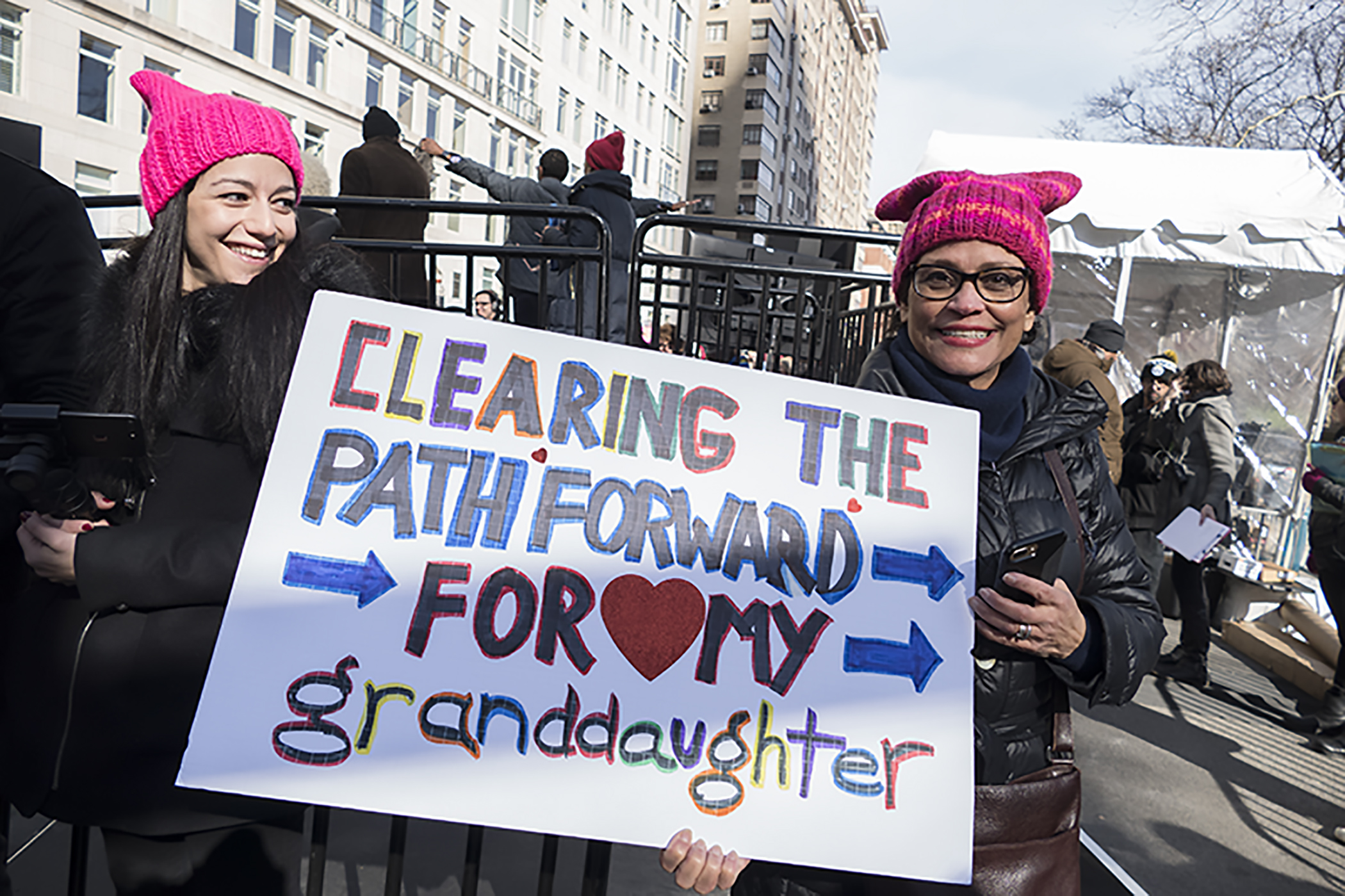


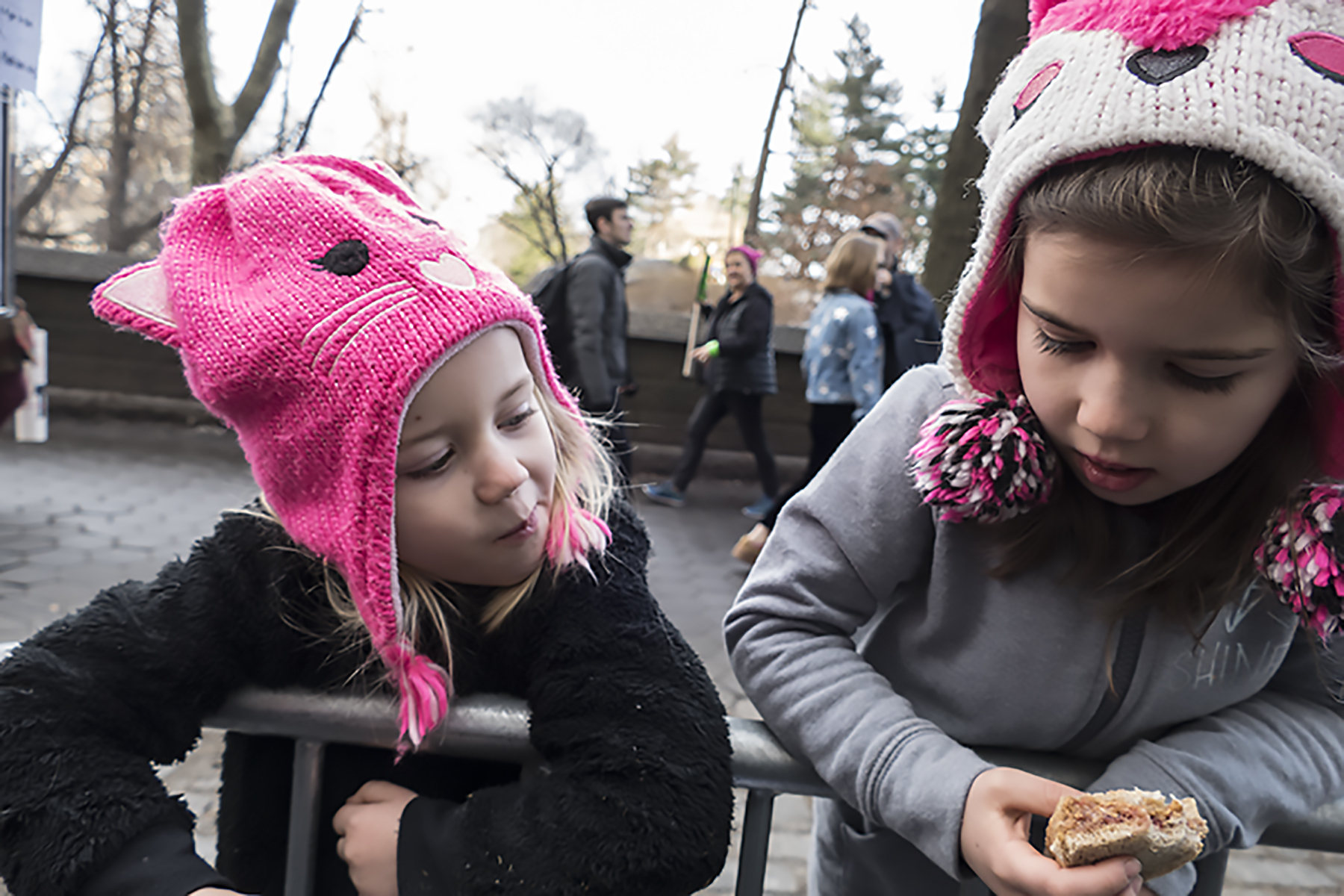
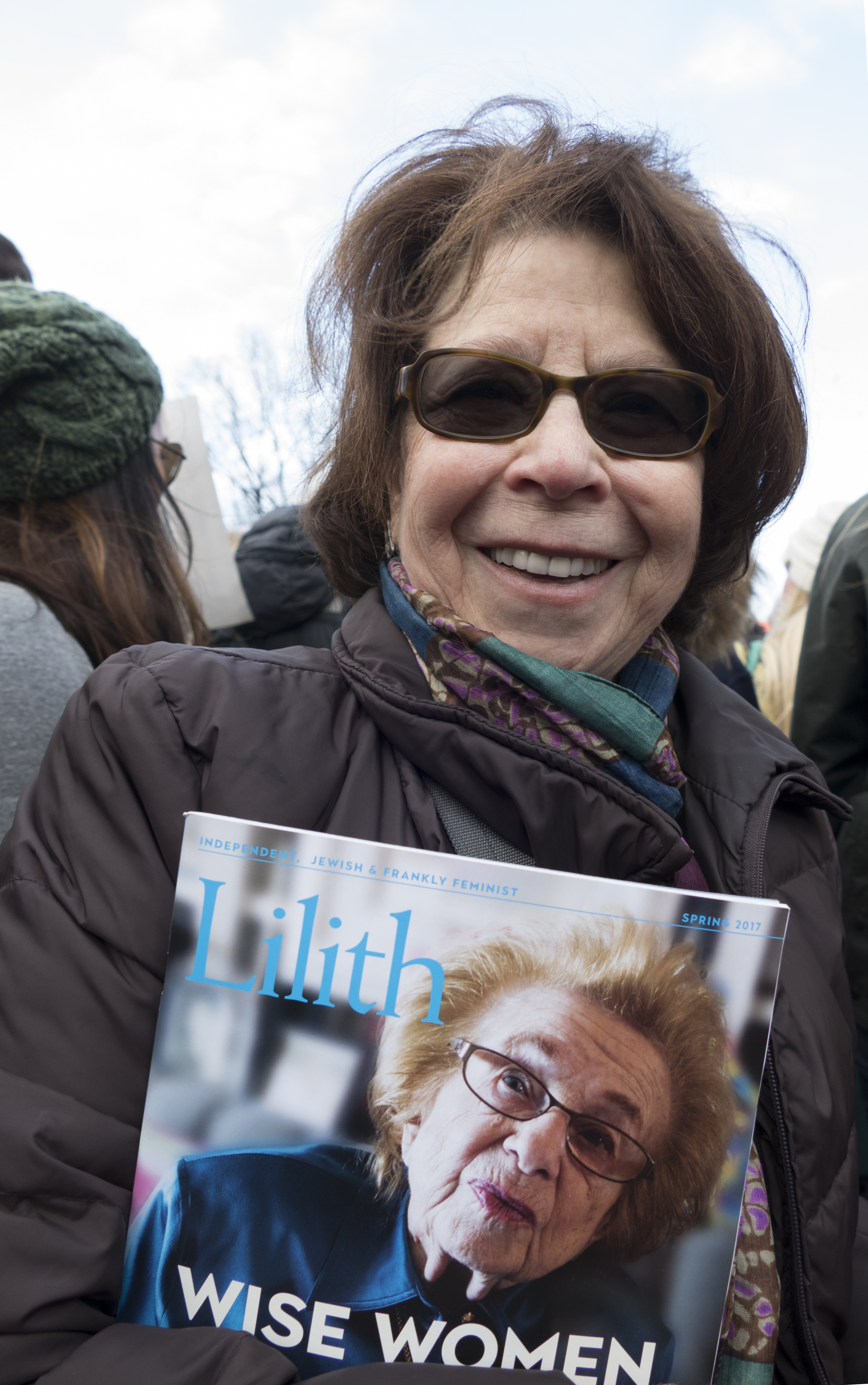
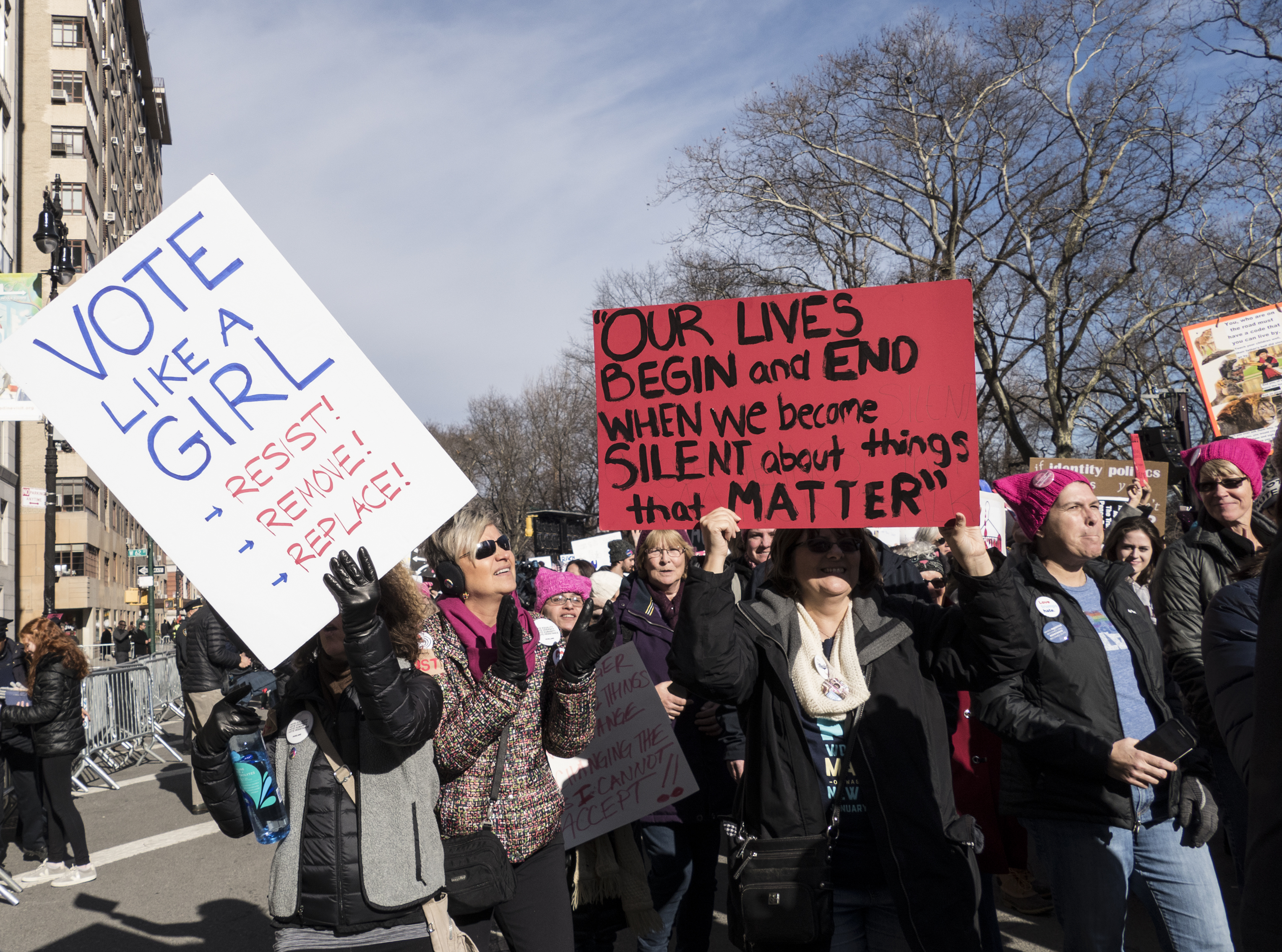

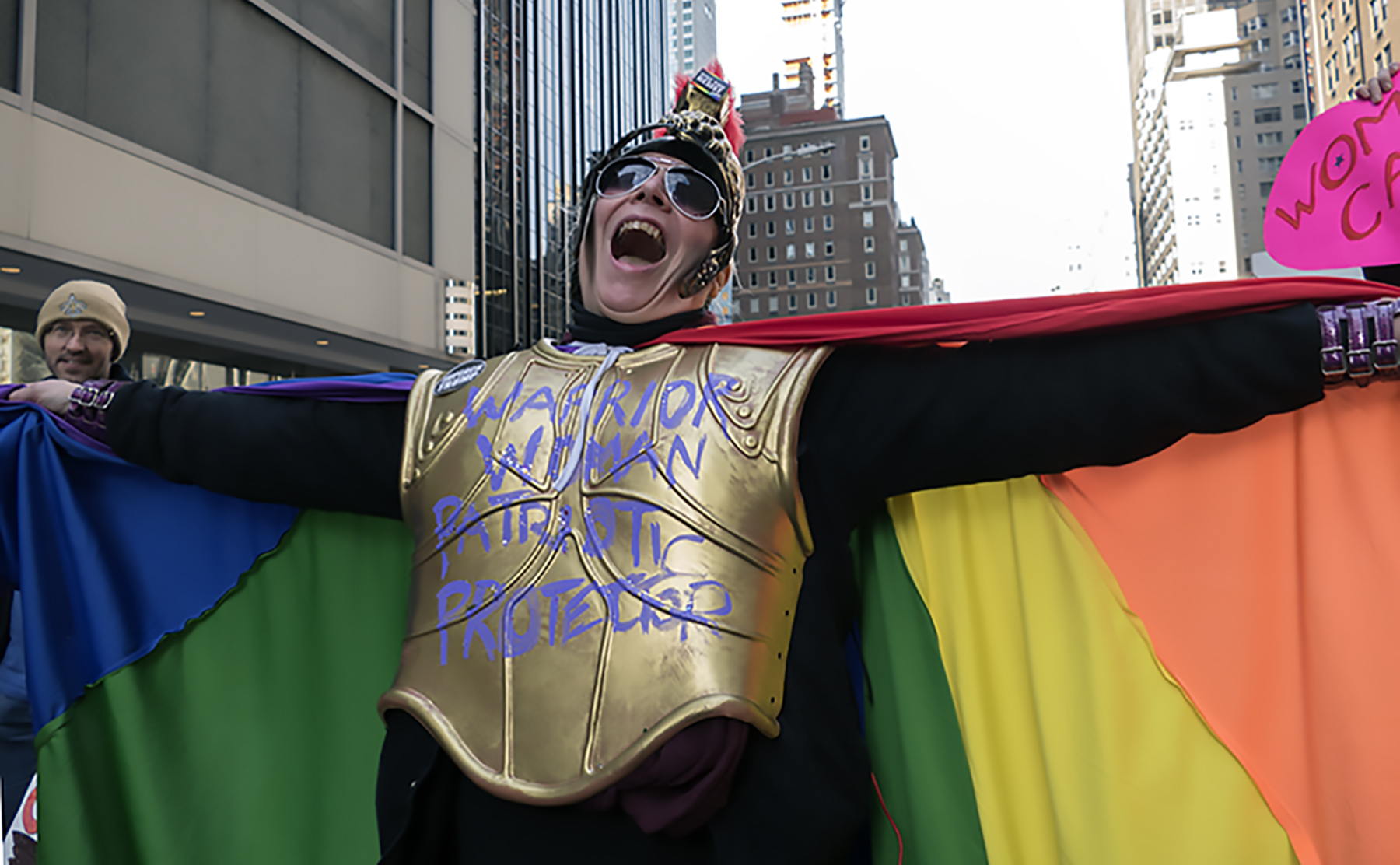 Shira Gorelick, Los Angeles
Shira Gorelick, Los Angeles
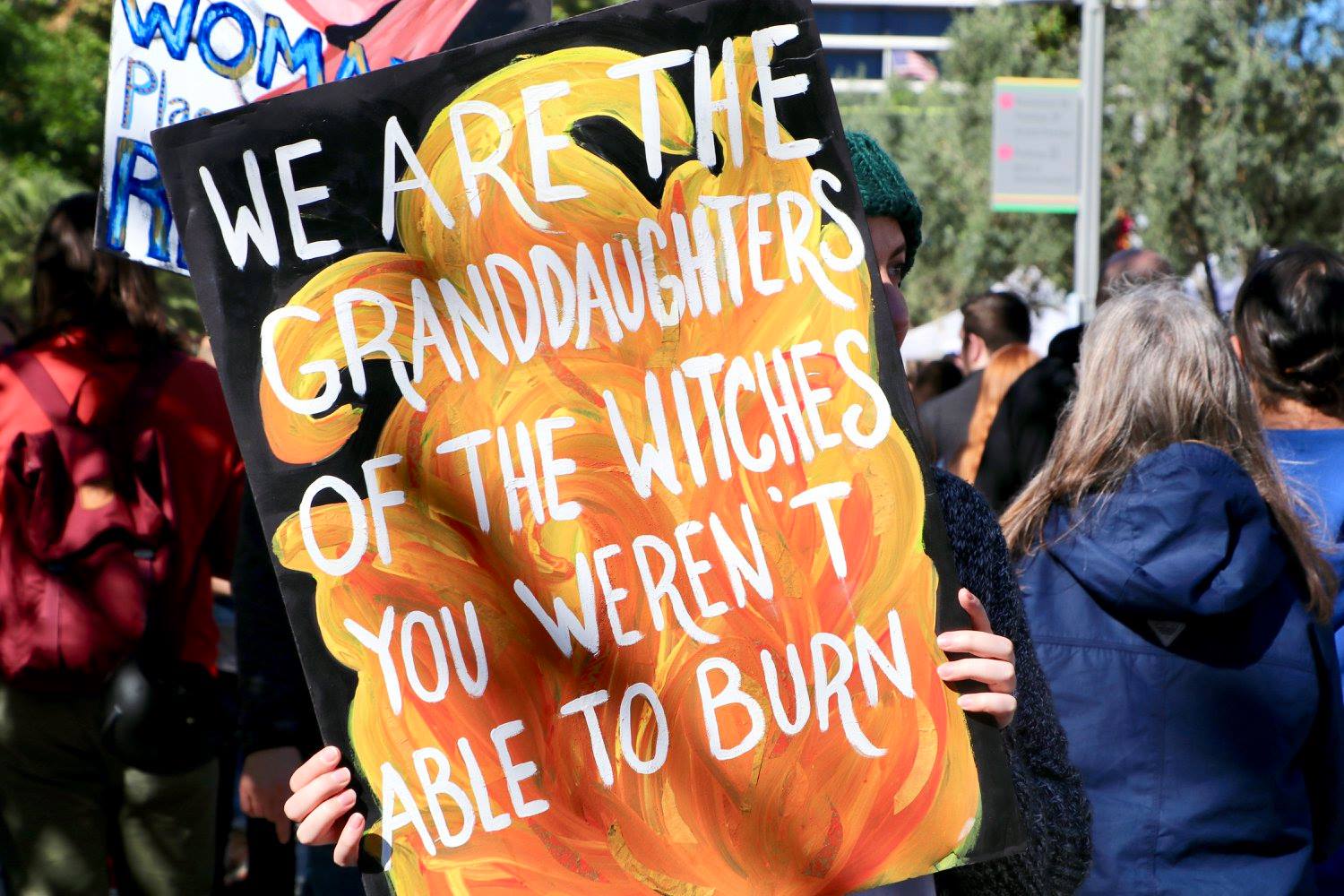
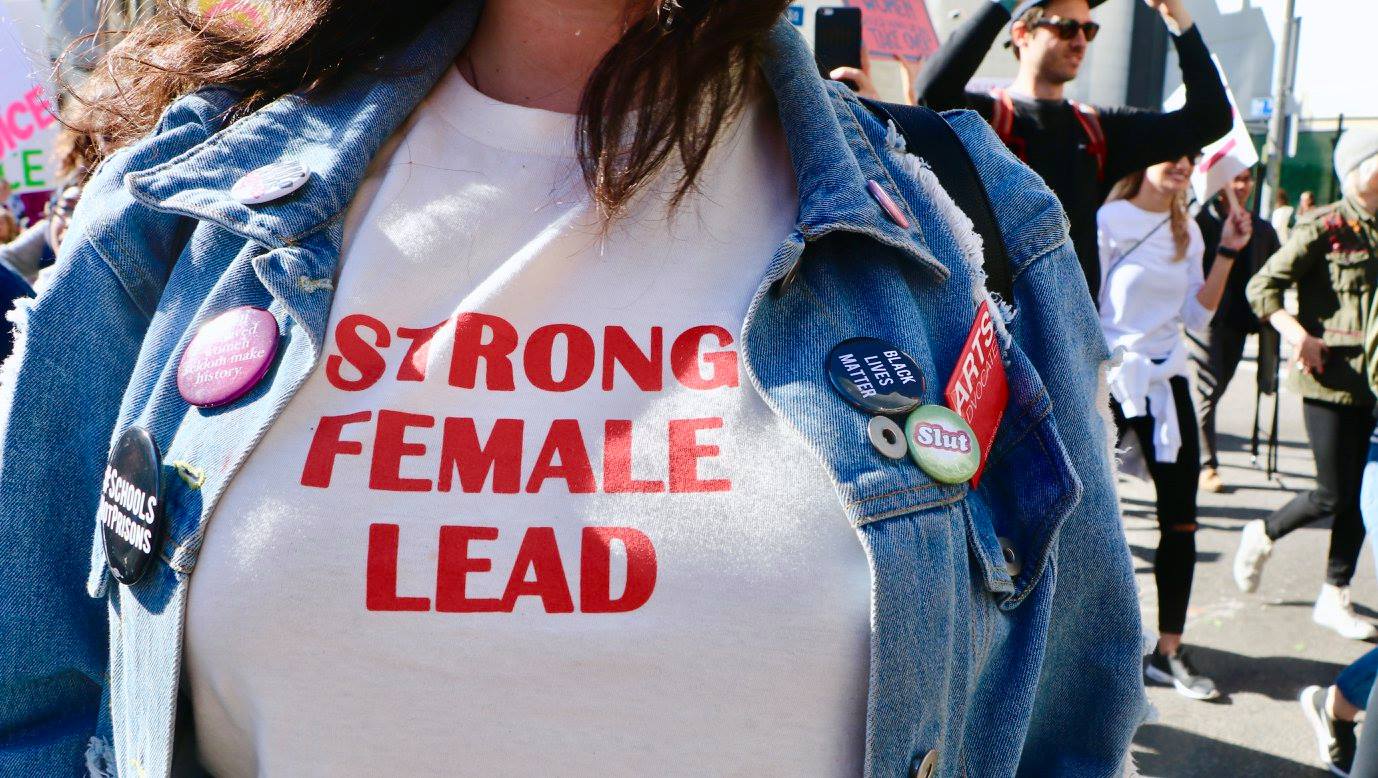
- No Comments
January 19, 2018 by Nancy K. Kaufman
Why We March
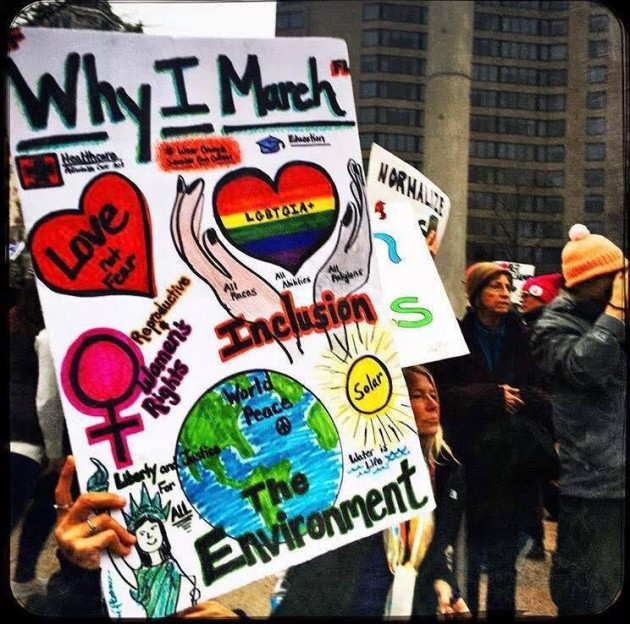
Photo credit: Shira Gorelick
Once again, women are on the march. We are indeed no strangers to marching. As women we have marched en masse for goals ranging from the idealistic to the pragmatic, and usually a mixture of both—the right to vote, the choice about when to give birth, family leave, and equal pay, among others. But not since the height of the civil rights movement have we felt so intensely that we are marching to save our nation’s soul.
2017 has seen an unrelenting attack on those our president disdains—women, people of color, immigrants, those in need of health care, with low incomes, with disabilities, anyone not white. We have always contested polices that hurt people who fall into these categories. We have rarely witnessed them treated with such contempt.
- No Comments
January 18, 2018 by Leon Wiener Dow
#YouToo: A Jewish Man’s Accounting
I simply cannot fathom the stories and images that are being cast our way—of men sending lewd pictures of themselves; initiating unwanted contact with women or forcing women to touch them; of placing women in a demeaning and uncomfortable position of having to reject unwanted advances; of masturbating in front of an unwilling audience. It’s not just vile; I simply don’t manage to understand how, or why, a man does those things.
After Danielle Berrin confronted Ari Shavit’s sexual misconduct in the fall of 2016, well before this latest wave of revelations of sexual harassment, I offered a confession that bears repeating: I should know better than to be surprised. I should not ask, #YouToo? with disbelief. #YouToo?, Louis C.K. #YouToo?, Roy Moore? #YouToo?, Al Franken? #YouToo?, Larry Nassar? #YouToo?, Harvey Weinstein? #YouToo?, Dustin Hoffman?
And yet: though the surprise is long gone, the disappointment of #YouToo? looms large. What’s more, the scope and persistence of the latest wave of revelations lead to a very real quandary: how am I to manage in a world in which so many men—many of whom I held in esteem, or whose work has been significant in my life—have acted so deplorably towards women?
To be sure, the continuing pain of those who have been subject to these abuses endures. But in this piece, I want to focus on how both we as individuals (especially men) and society as a whole can do a serious accounting of our varying levels of complicity in this rampant abuse.
- No Comments
January 18, 2018 by Monette Chilson
#MeToo Shows We Need New Archetypes
Everywhere we turn these days, women are speaking their truths. Using their voices to tell stories they’d rather forget. Sometimes they are demonized for it, but increasingly they are celebrated, their faces landing on magazine covers, their stories told and retold under the viral #MeToo banner. With twelve million Facebook interactions in 24 hours—more than #EverydaySexism and #YesAllWomen amassed in a year—#MeToo became the social media face of a movement that denounces sexual harassment and assault while validating the women who’ve experienced it.
Beneath all the high-profile names, the politics and the agendas, #MeToo is an interrupter—a woke moment when the collective consciousness shuddered just long enough to glimpse our depravity. And I don’t use that word only to describe the perpetrators of these predatory acts, but also the state of a culture that supports it. Where were our ideas about gender born? How wrong must they have been to allow this age-old story of sex and power to play out unfettered for so long?
To answer such questions, we must look to archetypes, the building blocks of our collective psyche. In the Abrahamic tradition, even for those with no religious affiliation, the building blocks of gender identity are Adam and Eve. The prototypical first couple, Adam and Eve are the embodiment of our largely unconscious ideas about what it means to be a man or a woman.
Therein lies the problem.
- 2 Comments
January 17, 2018 by Hanna R. Neier
Top Chef Judge Talks About #MeToo and Latke Reubens with Lilith
 With a prominent role on Top Chef, a new cookbook on the shelves, and a four-year-old daughter at home, Gail Simmons’ plate is full. Working her way from magazine intern to popular TV personality, Simmons has travelled the world, cooked in some of the finest NYC restaurants and launched her own female-focused production company, Bumble Pie Productions. Her cookbook, Bringing it Home: Favorite Recipes from a Life of Adventurous Eating (Grand Central Publishing, 2017), is a collection of recipes inspired by her experiences mixed in with twists on Jewish classics from her childhood.
With a prominent role on Top Chef, a new cookbook on the shelves, and a four-year-old daughter at home, Gail Simmons’ plate is full. Working her way from magazine intern to popular TV personality, Simmons has travelled the world, cooked in some of the finest NYC restaurants and launched her own female-focused production company, Bumble Pie Productions. Her cookbook, Bringing it Home: Favorite Recipes from a Life of Adventurous Eating (Grand Central Publishing, 2017), is a collection of recipes inspired by her experiences mixed in with twists on Jewish classics from her childhood.
Recently, Simmons spoke with Lilith about Latke Reubens, raising an adventurous eater and how the #MeToo movement is affecting a male dominated food industry.
In Bringing it Home , you mention that some of the best Top Chef moments come from contestants tapping into their roots. Can you talk about how your Jewish heritage influenced your love of food and cooking?
GS: Food is such a huge part of all cultures, I think. So much of my Jewish background is from a childhood celebrating holidays around the table. I spent a lot of time learning to make (and eating!) those great dishes that were passed from my grandmother to my mother and my mother to me; things like matzo ball soup and brisket and latkes and my mom’s chopped liver, traditional Eastern European food. When my grandmother and great-grandmother were making these dishes fifty or one hundred years ago, they didn’t necessarily have access to good quality food. The brisket was used because it was a cheap cut of meat—that was the way to cook back in the shtetel. But now I can get really incredible cuts of meat, access really great technique, and make sure the version I make is the best possible one. I try to preserve the integrity of the food, but I take liberties. For example, taking the classic latke, making it the exact same way that my mom made it for me growing up, but making it into a Latke Reuben, adding a great sour cream sauce, a fresh apple slaw and some slices of pastrami because I think it’s really fun.
- No Comments
January 16, 2018 by Amy Stone
At the NY Jewish Film Festival: “The Impure”—Yes, nice Jewish girls and women were prostitutes in Argentina
More timely than ever—think trafficking and violence against women, think Time’s Up‑ “The Impure” (New York Jewish Film Festival Jan. 16) digs into Argentina’s subculture of Jewish prostitutes and pimps in the massive immigration from Eastern Europe starting in the 1880s.
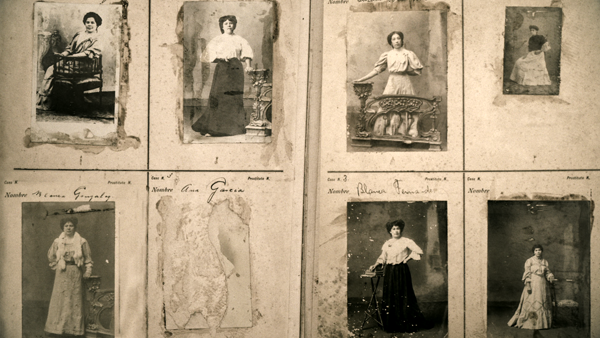
Argentina’s legal prostitution attracted Eastern Europe’s Jewish underworld, riding the wave of 100,000 Jewish immigrants, mostly male. “Impuros” was the term created by the respectable Jews of Argentina to distinguish themselves from the similar-looking immigrants in the sex trade.
What opens as workmanlike documentation–shots of neglected headstones, black-and-white stills of 1880s Buenos Aires, soulful music–gets interesting as the film’s director discovers his own family connections to the sex trade.
- 1 Comment
January 12, 2018 by admin
Yet Another Study Shows Women Can Safely Self-Induce Abortion—When Given Proper Information
A new study conducted in Peru, where abortion is legally restricted, finds that women can safely and effectively self-induce abortion after receiving information from a healthcare provider about how to use the drug misoprostol. Although abortion is common in Peru, few women qualify for legal services, and many instead seek out clandestine providers or use unsafe methods on their own.
Researchers at Ibis Reproductive Health, the University of California San Francisco (UCSF) and the International Planned Parenthood Federation/Western Hemisphere Region documented outcomes with a harm-reduction model of care implemented at non-governmental clinics in Lima and Chimbote. Women who said they were considering ending their pregnancy were evaluated by nurses, given information about ways to use misoprostol that are scientifically shown to be safe and effective for early abortion. They were encouraged to return to the clinic to ensure the abortion was complete, treat any complications and receive contraception. The study followed 220 women who took misoprostol on their own after a clinic evaluation.
“We found that almost 90% of women reported having a complete abortion after taking misoprostol, and very few had medical complications, such as heavy bleeding, infection or severe pain,” Dr. Daniel Grossman, the director of Advancing New Standards in Reproductive Health (ANSIRH) and lead author of the study, said. “Our findings corroborate those from a growing number of studies indicating that women can safely and effectively use medication abortion on their own with minimal clinical supervision.”
Grossman shared with Lilith the ways he sees Judaism informing his work for reproductive justice. “I think my Jewish upbringing instilled in me a strong sense of tikkun olam or ‘repair of the world’ and a desire to work for the welfare of society at large,” he said. “My parents aren’t very observant Jews, but they were active volunteers in our temple’s social action work. My research on access to reproductive health care, as well as my clinical activities, are certainly motivated by a desire to reduce disparities and ensure that all people can attain the highest level of health possible.”
- No Comments
January 11, 2018 by Helene Meyers
Our Bodies, Our Memories, Our Poetry: A Review of Lesléa Newman’s “Lovely”
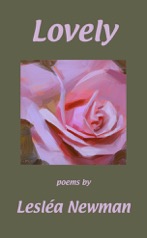 Lesléa Newman is a woman of a certain age, and Lovely, her new volume of poetry (Headmistress Press, $15), revels in that fact. In this collection, Newman’s birth family shares these pages with her beloved. She chronicles her shifting relationship with her own body as she memorializes those who were often violently forced to leave theirs behind. While many of these poems celebrate the sensual pleasures of the past and present, Newman also fleetingly envisions a world to come.
Lesléa Newman is a woman of a certain age, and Lovely, her new volume of poetry (Headmistress Press, $15), revels in that fact. In this collection, Newman’s birth family shares these pages with her beloved. She chronicles her shifting relationship with her own body as she memorializes those who were often violently forced to leave theirs behind. While many of these poems celebrate the sensual pleasures of the past and present, Newman also fleetingly envisions a world to come.
Newman’s trademark compassion is on full display in “Home Safe.” Here the language of nursery rhymes frames the trauma of childhood sexual exploration and abuse: “Little Girl Blue/What happened to you?/Who was it? Who?/And what did he do?” Yet even as the speaker gives full voice to a little girl’s confusion and pain, she also belatedly recognizes that the boy child who overpowered her must himself also have been a victim: “Little Boy Blue,/What happened to you?/Who was it? Who?/And what did they do?”
Several poems are devoted to the life and death of Newman’s mother, the subject of a previous volume of poetry, I Carry My Mother (2015). In the prose poem “Maidel,” the foibles and wisdom of a loving Jewish mother are wittily conveyed, while the somber “My Mother Cups Her Hand” reflects the words not spoken as death becomes imminent.
In “1955-2001: A Hair Odyssey,” Newman’s “frizz bomb/kinky head/Jew fro/ the human barometer” charts her aging process and a path to self-acceptance. The gorgeous “Blessed are the Weeds” metaphorically tells a similar story as “they are not afraid to take up space” and “they respect their roots.” More whimsical is “Your Loss: To The Lovely Butch In Front Of Me At The A&P,” which presents a femme consumer of Hungry Man Dinners as fully able to appreciate “the gluten-free, sugar-free, dairy-free yet delicious-looking pair of sticky buns” in said butch’s basket. And while very few poets could pull off turning a kasha knish into a suitable subject for poetry, Newman manages it in “Ode to a Knish Shop.”
Reminiscent of Newman’s dazzling 2012 October Mourning: A Song for Matthew Shepard, “That Night” is the litany of those who were murdered at Pulse, a gay nightclub in Orlando, on June 12, 2016. In this moving poem that also does the work of queer history, the bar scene is juxtaposed with the horrific death scene that unfolded: “That night the music pulsed through our veins/That night the bullets tore through our veins.” Such historical horrors give rise to “A Farewell to Arms,” a Newmanesque version of John Lennon’s “Imagine” in which bullets, pistols, missiles, stoning, torture, and snipers are no more. In this world to come, there will be “No more hatred, no more blame/No more killing in God’s name.”
The final section of the volume, titled “Nasty Women,” is an intensely personal paean to queer love. The historical “To Have and To Hold” commemorates May 17, 2004, when Massachusetts issued the first marriage certificates to queer couples “bursting with pride.” “The Coming Storm” cunningly counterpoints a meteorological disturbance with orgasmic love and passion: “Outside nasty weather/Inside nasty women.”
Lovely truly is a lovely read and a reminder that the most personal poetry can simultaneously speak to our collective lives, bodies, and histories.
Helene Meyers is Professor of English and McManis University Chair at Southwestern University in Texas. The author of three books, most recently Identity Papers: Contemporary Narratives of American Jewishness, she is currently at work on a project about Jewish American movies. Her more journalistic work has appeared in Lilith, Tablet, Forward, Ms. Magazine Blog, the Washington Independent Review of Books, the Chronicle of Higher Education, and Inside Higher Education. Find her on Twitter: @helene_meyers
The views and opinions expressed in this article are the author’s own and do not necessarily reflect those of Lilith Magazine.
- No Comments
 Please wait...
Please wait...